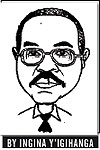In Rwanda of the 1950s, it was common to meet somebody called Mvuyekure. Being of tender age at the time, I never thought twice about the name carrying a potent meaning. Today, however, when I look back at the deadly incidents that I survived, I understand. ‘Mvuyekure’ is in the Kinyarwanda language and it can translate as ‘I’ve come a long way’.


In Rwanda of the 1950s, it was common to meet somebody called Mvuyekure. Being of tender age at the time, I never thought twice about the name carrying a potent meaning.
Today, however, when I look back at the deadly incidents that I survived, I understand. ‘Mvuyekure’ is in the Kinyarwanda language and it can translate as ‘I’ve come a long way’.
And considering that Rwandan parents sited incidents and circumstances at birth in naming their children, you can tell a lot about a person just by their names. Which is why I wonder why I was not given that name!
In our time, even a time of leisure involved dangers that could put a seal to your young days! For instance, our favourite game was sliding down the slope of a muddy hill.
It was like skiing, but you slid down the muddy hill on your bare bottom, not on your shod (protected in shoes) feet.
Why ‘bare’ and why ‘bottom’, you may ask.
You see, shoes were exclusively for the colonialists and their children. Among Rwandans, only King Rudahigwa and a few chiefs, together with some privileged Rwandans who’d gone to school, could sample the luxury of donning shoes.
This elite group of Rwandans were a cross between the superior colonial masters and the ‘primitive’ Rwandans and were known as ‘les évolués’, those who have evolved. Other Rwandans were known as ‘les indigènes’, ‘natives’.
It was the same with shorts and, as for trousers, I remember sighting only Bwana Rutumbu, the Belgian proprietor of Gitare Mines, wearing them during the whole time I was in Rwanda, before we were sent into exile by colonialists and their fabricated Parmehutu.
Among the native children, then, those who came from well-to-do families wore knee-long shirts, while others tied a lasso around their necks. The lasso used to hang down to the knees.
Even then, these ‘clothes’ were also precious and you could never dare soil them unless you wanted your parents to whip your bottom sore. Of course, there were many youths who did not have to bear the encumbrances of clothing!
Anyway, how did we ski? Our skis were the bark of a banana trunk (ikivovo) and, because we didn’t have any ski poles to steady us, we skied on our bottoms with our arms acting as the ski poles and to propel us forward.
And because we didn’t want our clothes spoilt in any way, we shed them off and skied nude.
It was an exhilarating time and we used to have what in to-day’s lingo is called a ‘bang’. Like everything good, however, the skiing sessions used to come with their hazards. Like this time, when we were skiing with Rusunzu.
Rusunzu was a stout boy who always wanted to do things differently to exhibit his flair for adventure. While we were using our beaten track, the one that we had cleared of jagged pieces of wood and stone, he picked on a rarely used one.
As he was zooming down the slope, he sent out a chilling shriek and we turned to see him rolling crazily as blood spluttered in the air…..then silence. We immediately ran down to the foot of the hill to check, only to find him still.
We crowded around him to see if he was breathing but he was not. The oldest of us, who could dare, shook him as he shouted for water to douse his face. Rusunzu came to; happily, he was alive!
But…..what was the source of that blood? When the oldest boy checked and announced to us: "His things are hurt!” ("Ibintu bye byakomeretse!”), we knew what he meant and recoiled in imagination.
Four strong boys helped to lift Rusunzu and we followed morosely, none uttering a word until the bad news was announced to the parents, where they were busy cultivating their land.
An evacuation operation was immediately organised and he was taken to Mutorere Hospital, about 20 km into Bufumbira, southern Uganda.
The evacuation was not the fastest, of course, as it involved four men who carried him in a sort of hammock (ingobyi) and walked all the way to the hospital.
Soon after, we were sent into exile in Bufumbira and found it even easier to frequently check on, and look after, him. Meanwhile, his parents and our other neighbours were visiting as they brought us food from our fields in Rwanda.
After about six months he was discharged and came to live with us, but no one could broach the subject of whether he heeled completely. Rusunzu stayed and, since everybody was convinced that we’d soon be going back to Rwanda, nobody bothered to come for him.
Soon we sent him back, though, as his parents were not among the targeted group. That was the last we saw of him and, even in January 1995 when I went back, I was told that he’d gone to D.R. Congo.
A classic example of how the colonialist tore apart the Rwandan family.


